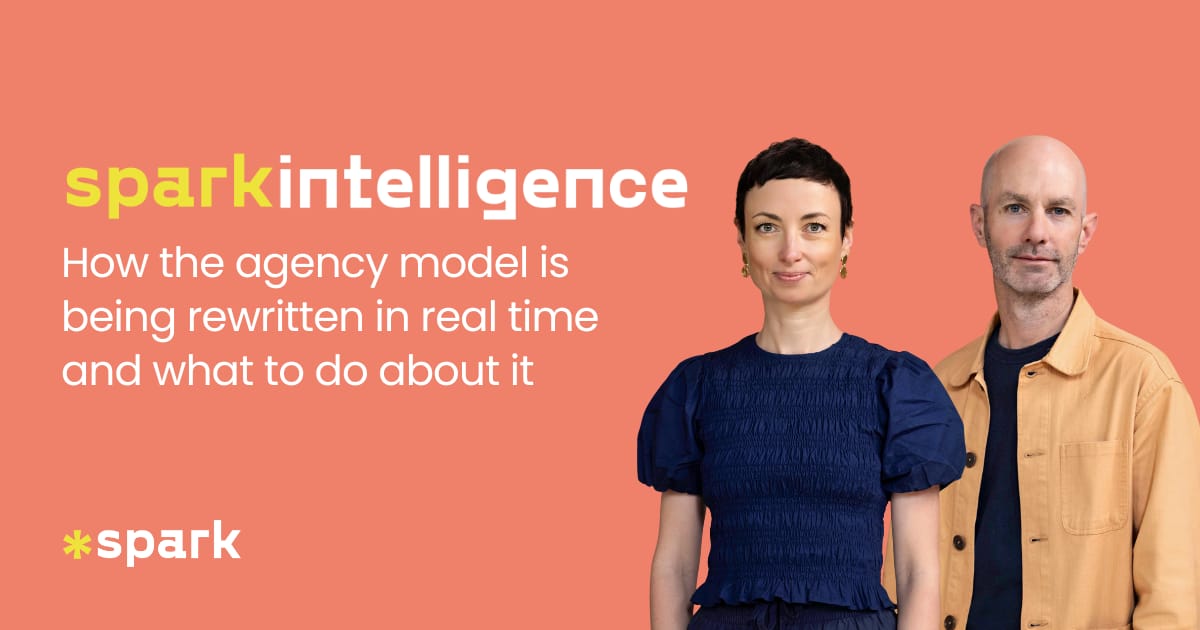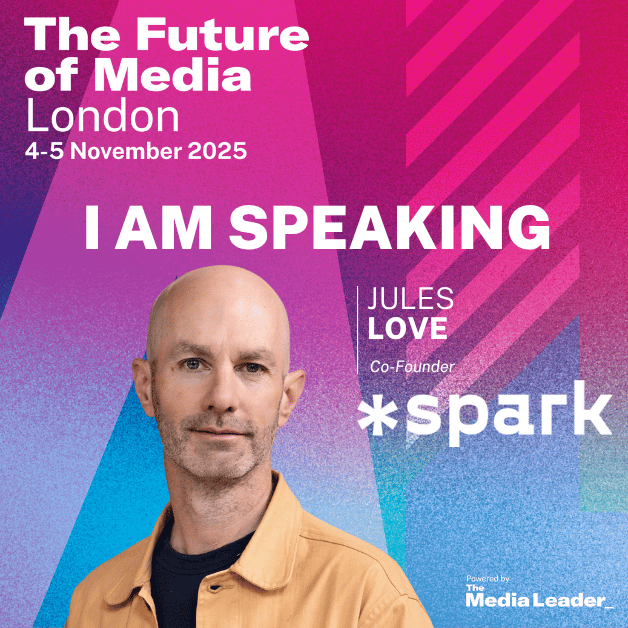- Spark Intelligence
- Posts
- Spark Intelligence #32: How the agency model is being rewritten and what to do about it
Spark Intelligence #32: How the agency model is being rewritten and what to do about it
The AI brief for creative leaders to grow your business and career, by Spark AI

👋 Greetings earthlings,
Here's your regular dose of creative AI insight from me: Emma co-founder of Spark AI. Hello to all our new subscribers! This is your fortnightly long read of everything you need to know about AI in your world of work.
This week brings a moment that crystallises everything we've been watching unfold. WPP just launched a self-service platform that lets brands bypass agencies for certain work - a fully commercial product targeting both their own clients and businesses who couldn't previously afford agency fees.
It's a signal that the execution layer of agency work is being productised. But the takeaway for us isn’t scaremongering, it’s that whilst WPP sells software to do traditional work faster, the most forward-thinking agencies are using the same technology to build entirely new services and IP. So don’t focus on what's being commoditised and the race to the bottom - look to what new things you can create. We’ve found that the conversations in our AI workshops have shifted in a similar way.
Also loads of new product drops to keep you updated on: Video will soon be genuinely conversational, browsers are being rebuilt with AI at their core and Copilot has put the burners on their race to catch up with all the features in ChatGPT, Claude and Gemini.
The big question this brings to mind for us? It’s no longer about whether AI will change your business - now its all about how you build capabilities that can't be replicated by platforms. And in the nick of time, my co-founder Jules’ new book, Shift - AI for Agencies, is coming out on 4th November to guide you though this very transition.
Here's what we're unpacking:
1. WPP changed the game with Open Pro
WPP dropped Open Pro this week, a platform that lets brands plan, create, and publish campaigns independently with self-service software. No agency required. So, why would they do this?
What it does:
The platform combines three functions: AI-powered strategy (using WPP's proprietary data), content creation at scale (generating on-brand ads and assets), and direct publishing to ad platforms. Users pay an access fee plus usage charges. Currently focused on digital performance media rather than highend creative, however WPP's CTO says "there's virtually no marketing content that you can't make with AI."
What audience are they targeting?
Regional/business unit teams within large global brands - Teams that want to adapt and personalise campaigns while maintaining global brand compliance. They get freedom to move faster without going through full agency processes.
Performance marketers in fast-moving sectors (ecommerce, finance, etc.) - People who need to rapidly create, test, and optimise high volumes of ads with measurable outcomes. Speed and volume are the priority.
Smaller businesses, startups, and growing brands - Companies that previously couldn't afford WPP's expertise or didn't have the scale to work with their agencies. This is what WPP calls the "unserved segment" of the advertising market.
Existing WPP clients who want faster, more efficient access to WPP's tools without full managed services.
So WPP is targeting both ends of the market - big brands who want speed and autonomy for certain work, AND smaller brands who were previously locked out. It's essentially creating a two-tier model: premium managed services for complex strategic work, and self-service platform for execution.
Here's what WPP is really saying:
Strip away the corporate language about "democratising access" and "expanding addressable markets," and this announcement feels remarkably candid: they are saying that a huge portion of what agencies currently charge for can be productised. Strategy development, content production, media planning? Increasingly software problems, not service problems.
WPP isn't doing this because they're feeling generous. They're doing it because if they don't, someone else will, and with their internal Open system they are in a great position to do so. Better to cannibalise yourself than be disrupted by a startup that doesn't have to protect legacy revenue.
CEO Cindy Rose (who joined from Microsoft in September) positions this as expanding WPP's market. CTO Stephan Pretorius insists it's "additive" and won't replace managed services. Perhaps.
What this means for agencies:
If you're running an agency right now, this matters. Not because WPP specifically is your competitor, but because it validates a trend you can't ignore.
First, the execution layer is being pulled away. If strategy and content creation can be packaged as software that brands access directly, that work no longer commands premium fees. The market's telling you: this is table stakes, not differentiation.
Second, your competitive landscape just expanded. You're not just competing with other agencies anymore. You're competing with platforms that offer instant access, predictable pricing, and 24/7 availability. Your pitch about "deep partnership" and "strategic thinking" needs to be genuinely compelling, because the alternative is increasingly viable.
Third, and most importantly: speed wins, but only if you're solving the right problem. Open Pro can generate campaign assets faster than any team. But speed doesn't matter if you're running in the wrong direction. The question isn't "how quickly can we create this campaign?" It's "should we be creating this campaign at all?". It's still down to the operator.
Here's what platforms like Open Pro can't do:
They can't challenge a brief that's solving the wrong problem and they can't tell you that your brand positioning is fundamentally confused. They also can't navigate the messy politics of stakeholder alignment! They won’t spot the cultural shift you should be responding to but aren't and they definitely can't build the kind of trust where a client calls you first when something's gone sideways.
They also can't tell you that AI execution might be eroding your brand's distinctiveness, or that you're optimising for efficiency at the cost of memorability. Software optimises within constraints. It doesn't question the constraints.
The path forward isn't to compete on execution:
Some agencies will try to match platforms on speed and cost. This is a losing strategy. You cannot out-software software. The technology will only get faster and cheaper.
The agencies that thrive will move upstream or they will innovate with new services. They'll focus on the work that requires human judgment, cultural intelligence, and the courage to say difficult things. They'll help clients figure out what problems are worth solving before anyone starts generating assets.
The real opportunity - build new IP and services:
Whilst WPP is productising traditional agency work, the smartest agencies are using AI to create entirely new value. They're not just protecting what they have. They're building proprietary tools, developing new services, new methodologies, and creating IP that becomes a competitive moat.
Think about it: the same AI that threatens commodity execution also enables you to build custom solutions that didn't exist before. You could develop proprietary research tools that generate insights faster than traditional methods. You could create custom AI agents trained on your specific strategic frameworks. You could build tools that solve client problems in ways that platforms like Open Pro can't touch.
We're seeing agencies develop their own synthetic research platforms, build custom brand intelligence tools, create AI-powered cultural monitoring systems, and develop proprietary planning frameworks that combine AI speed with human strategic thinking. This isn't theoretical. It's happening now.
The difference? These agencies aren't asking "how do we use AI to do what we already do faster?" They're asking "what can we build with AI that creates entirely new value?"
Why this matters more than defending the old model:
Defending existing services is a rear-guard action. Building new ones is growth. And here's what's crucial: you have advantages that tech companies don't. You understand client problems deeply. You know what actually works in the market. You have relationships built on trust. You understand culture and creativity in ways that platform builders don't.
Use those advantages. Build services that combine your domain expertise with AI capabilities. Create things that clients can't get from WPP's platform or any other generic solution. Make your agency valuable not because you do traditional work better, but because you do new work that didn't exist before.
Our AI Accelerator is designed to navigate you through the AI transition: Role-specific AI fluency for designers, strategists, client services and agency transformation planning with leaders.
2. Our co-founder Jules' book tackles the biggest agency trap right now (and launches next week!)
Here's the trap many agencies fall into: using AI to make their work faster and cheaper. It feels efficient, but it quietly erodes your value.
In Shift: AI for Agencies, Jules explains the better path: using AI to uncover creative routes you'd never explore otherwise, validate bold ideas, deliver work that commands higher value, and innovate with new services.
The book introduces frameworks to get to AI maturity, helps you identify where AI creates genuine value in your business, and shows you how to avoid the race to the bottom. It's written for agency leaders who want to lead with AI, not just use it.
The book launches 4th November with a special offer for anyone who picks it up in the first couple of days. Worth watching your inbox for that one. 👀
Right now we're knee-deep in launch prep! If you've ever published a book, you'll know it takes over your life completely. We're spending our Saturday in the office packing early copies to send to clients. They'll be among the first to read it, and we can't wait to hear what they think. Here we are with our packing production line just a couple of hours ago… all winging their way in the post now!
 |  |
Can’t wait a week?
Download Chapter One for free and start mapping your agency's journey to AI maturity. We'll give you a heads up when the book goes live.
3. ⚙️ Tool updates worth attention ⚙️
Synthesia's Video Agents change what video can do
Recently Synthesia announced Video Agents, which are genuinely different. Not better video generation. Not faster production. Something new that we started to hear rumblings of at Cannes this year: structured, real-time conversations with video. This is tipped to be the way interacting with AI will move over time.
Why it matters: There are use-cases abound for agencies - interactive brand storytelling, interactive employer brand videos, immersive events and campaign experiences, interactive training, interactive pitches… the imagination goes wild!
These aren't pre-recorded videos. They're AI agents that can have actual conversations, customised with your data sources, guardrails, and triggered automations. All shareable via one link with full control.
Video Agents arrive late 2025, but the concept is worth exploring now.
Microsoft doubles down on ‘human-centred’ AI
Microsoft's latest Copilot announcements last week focus on what they call "humanist AI." Key features include Copilot Groups (up to 32 people collaborating with AI - perhaps a replacement for work WhatsApp groups if you’re not using Slack?), and Copilot Mode in Edge (combining voice, vision, and actions). There are a tonne of other updates Copilot has dropped at the same time - all these are more about levelling the capability of Copilot against things Gemini and ChatGPT already do - with features like it remembering core information about you or your business (Memory), something similar to Google NotebookLM (called Study Mode) and Connectors - where you can now link to other business systems like Google Drive.
Why this matters: We think the most impactful change here is that Edge will now organise your browsing history by topic and intent, not timestamp. It's a small example of AI restructuring information around how humans actually think, not how computers store data.
Mustafa Suleyman's positioning on “humanist AI” was: "AI that helps you connect with your real-world relationships, instead of roleplaying romance. AI that supports to show up in the real world, instead of pulling you away from it."
Browser wars just got interesting: Comet, Atlas and Edge
The humble web browser is undergoing a major renovation. OpenAI's ChatGPT Atlas is a new web browser with ChatGPT built in. Not bolted on. Built in. ChatGPT can see what you're looking at, understand your context, and complete tasks without you leaving the page. It remembers conversations and can pull from browser memories (optional, and you control them). Agent mode lets it research, analyse, automate tasks, and plan while you browse.
One early tester described using it during lectures: "ChatGPT instantly understands what I'm looking at, helping me improve my knowledge checks as I go." No screenshots, no copy-paste, no context switching.
This follows Perplexity's Comet browser launch and Microsoft's Copilot Mode in Edge announcement (also this week, see above!). Three different companies, same bet (same space-race style competition). Bottom line is the future browser isn't a tool you use to access AI - it's AI that helps you use the web - a nuanced by important difference.
Why this matters for agencies and brands:
When the browser becomes conversational, how people discover and interact with your content fundamentally changes. They won't just click links. They'll ask questions. The browser will synthesise answers from multiple sources, remember context from previous visits, and surface information based on intent.
This connects directly to the Amazon story above. Content discovery is being rebuilt around conversation and intent, not keywords and links. If your web content doesn't work in conversational contexts, you're building for yesterday's internet.
Questions to consider:
Can an AI assistant easily understand and explain what your website offers?
Does your content answer the questions people actually ask, or just the keywords you want to rank for?
How would your brand show up if someone's browser is actively helping them make decisions?
Many of the same principles as good SEO. Find out more about Atlas
Claude introduces Skills
Anthropic has released Skills for Claude, which fundamentally changes how you can customise Claude for specific workflows. Skills are folders containing instructions, scripts, and resources that Claude loads dynamically only when relevant to the task at hand.
Here's what makes Skills different:
Unlike Claude Projects (which provide static background knowledge that's always loaded in that workspace), Skills work everywhere across Claude and only activate when needed. Claude uses "progressive disclosure" - it initially sees only skill names and descriptions, then autonomously decides which Skills to load based on what you're asking it to do.
Practical applications for agencies:
Brand guidelines: Instead of re-explaining your visual identity every time, create a Skill that activates when Claude creates branded materials
Report templates: Teach Claude your specific reporting format once, use it across all client work
Coding standards: Build Skills for your development conventions that activate when writing code
Research workflows: Package your research methodologies into reusable procedures
Anthropic provides several built-in Skills (Excel, PowerPoint, Word, PDF creation), and now you can build your own. Skills can also include executable code, making them powerful for complex workflows. We are going to be looking hard at how we can use Skills at Spark next month.
The strategic advantage:
Skills let you capture and codify your team's procedural knowledge. Instead of every team member explaining the same process repeatedly, you build it once and everyone benefits. It's like creating reusable expertise that works consistently across your organisation.
Skills are available on Pro, Max, Team, and Enterprise plans. They require code execution to be enabled.
Not a tool but a toolkit…BBC launches AI News Assistant toolkit
The BBC and European Broadcasting Union have developed a toolkit to help news organisations implement AI responsibly. It covers everything from editorial guidelines to technical standards, with a focus on maintaining trust and accuracy. The toolkit offers practical guidance on governance, transparency, and quality control. Interesting for our PR agency readers.
4. See you there?
Future of Media Masterclass | 4th Nov | Kings Place
On our Shift - AI for Agencies book launch day (4th Nov) Jules is going to be particularly busy - he will also running a masterclass at the Future of Media between 1pm and 2pm. Please drop by and say hello if you are planning on being there!
The masterclass is about how agencies can move from tinkering at the edges with AI to experimenting with new operating models and rethinking how value is created and captured. The session will take you on a journey from thinking about the current day-to-day, to the next stage: how AI will transform media over the next 10 years. |  |
That’s all for today. Don’t forget to download the latest edition of The Spark Report to learn how AI adoption is progressing in agencies and work out what your next steps are. And if you want to go deeper get Chapter One of Jules’ new book, coming to all good bookshops on 4th November.
See you next time!
Co-founder and CEO of Spark AI
What did you think of our email today? |
About Spark AI
We help creative and brand leaders turn AI experimentation into confidence - through structured adoption, upskilling and applied AI workflow building. Trusted by Oxford University Saïd Business School and backed by Innovate UK.